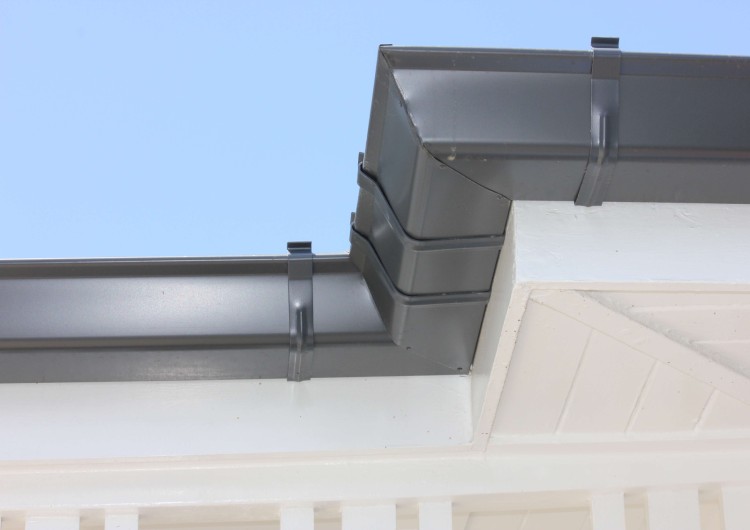
Downpipes are more than just roofing accessories–they play a big part in directing water away from your home. If your downpipe components become rusted, they may be damaged or completely stop working altogether.
These pipes move roof water from gutters and roof catchments to drains or storage tanks and include vertical and horizontal systems as per AS/NZS 3500.0
This article will highlight why downpipe repair needs to be at the top of your list and some of the measures you can take to fix them yourself.
Why Replace Rusted Downpipes?
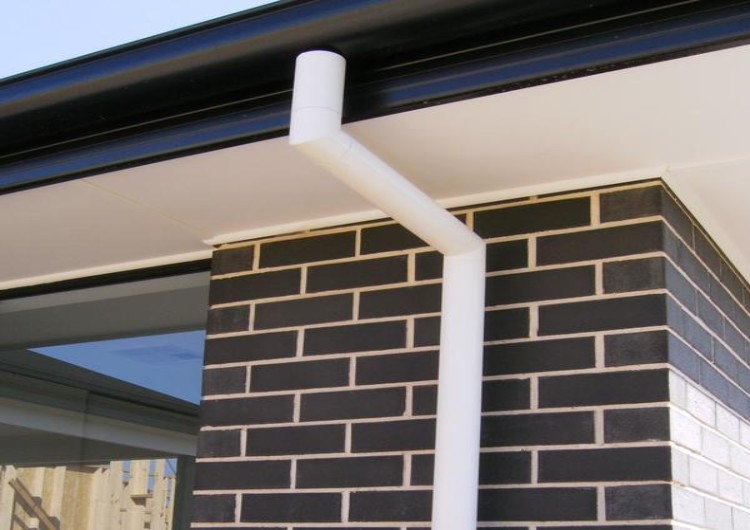
If you can see water stains building up on the roof ceiling, you can risk damage to fascia boards and snowball internal roof leakage, which you never want! Why is replacing your downpipes a non-negotiable preventative measure?
1. Prevent Water Damage
A rusty downpipe is a road to a number of water-related problems. Rust weakens most metals over time, and this can lead to holes or complete structural failures, which you don’t want.
Leaking water can infiltrate roofs, walls, and ceilings, creating a breeding ground for mould and mildew, impacting whoever lives with you. If you have respiratory conditions or allergies, replacing rusted downpipes prevents any risk of water damage.
2. Protect Property Foundation
When channelling water away from homes, the last thing you want to do is compromise the foundation of your home by leaving rust or water to pool.
Exposure to water weakens soil, causing foundation cracking, settling, uneven flooring, jammed doors and windows, or complete structural collapse. Replacing your downpipes is a small price to pay in comparison to the expense of foundation fixes.
3. Improve Your Home Exterior

Are you planning to sell your property? Corroded downpipes lower the value of your home, and you want the outside of your home to leave a lasting impression if you have interested buyers.
Modern downpipes come in a wide range of finishes, so you can pick an option that complements the style you’re looking for. What are some creative options for COLORBOND® steel?
- Matt finishes such as Surfmist, Dune, Shale Grey, Bluegum, Basalt, and Monument
- Classic finishes such as Manor Red, Jasper, Deep Ocean, Cottage Green, Woodland Grey, and Classic Cream
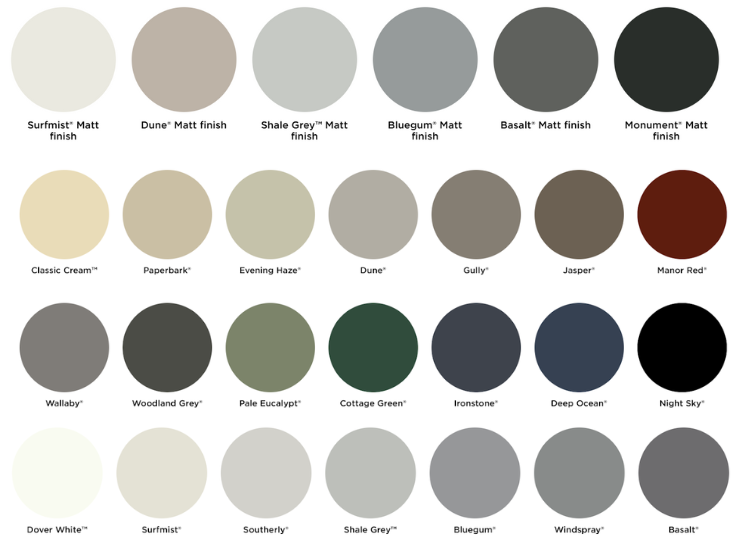
The colours shown represent actual product colours as accurately as possible. However, we recommend checking your chosen colours against an actual sample of the product before purchasing, as varying screens and devices may affect colours, tones and finishes.
4. Avoid Emergency Repairs
You might push back repairs due to having other commitments, but downpipes have the potential to fail during rain. Emergency flooding into your garage (or indoor spaces) is not the way to spend a night with friends and family.
Replacing downpipes that are rusted quickly helps avoid last-minute repairs and the inconvenience of water damage all at once.
5. Fix Water Drainage
Has water been sitting in the gutter? Downpipes are weakened by rust, but it can also cause unwanted internal blockages. Leaves, dirt, twigs, dirt, and debris combined with rust particles can clog the system and stop water flow.
A blocked downpipe can lead to overflow, eroded landscaping, and puddles. Investing in new downpipes means rainwater is carried away from your home.
Overall, downpipe replacement means:
- Better water flow (and no over-pooling or flood risk)
- Protection against frustrating water damage
- It becomes a long-term investment
- Slash maintenance headaches (such as continuous upkeep)
Remember, if your downpipes/guttering has rusted through, it cannot be repaired, only replaced.
Rusted Downpipes: When To Replace Them?
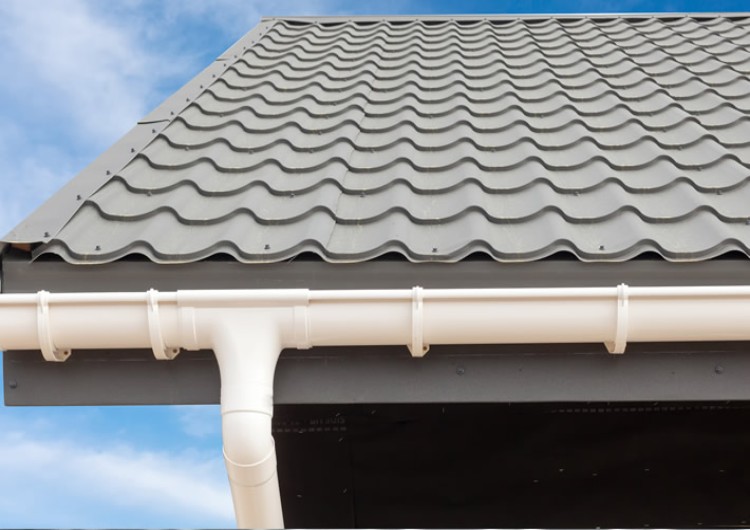
Although downpipes are often made from durable ZINCALUME® steel or COLORBOND® steel, they may need replacing after a bad storm or simply due to how old they are. Let’s take a look at some common signs you might need to book a roofing expert.
- Cracks, holes, or splits in your gutters are a clear indicator that they aren’t channelling water away from your home easily. Caused by UV damage, temperature changes, or age, sometimes a small crack can be repaired using a gutter sealant. Larger holes need professional intervention.
- You notice the water is overflowing after heavy rainfall. Blocked gutters, the wrong gutter size, and damage to the gutter system can result in gutters not being able to handle the volume of water. Your downpipe brackets can fail, loose pipes, or leak joints and seams.
- Your gutters are sagging; gutters are designed with a slight slope for water flow, but if they sag or pull away from your home, you need a closer look. The weight of debris (sticks or leaves) from strong winds can get caught in the brackets, and you don’t want to be dealing with water pooling around your home.
- Your gutters and downpipes are starting to look dull and old. If you’re renovating your home exterior as well, you might want to freshen things up with a full restoration.
- They are damaged or missing. Some signs of failing downpipes include cracks, dents, or sections that have been disconnected.
As per part 35 of the National Construction Code 2019 Amendment 1, downpipes must not serve more than 12 m of gutter length for each downpipe, be located as close as possible to valley gutters, and be selected in accordance with the appropriate eaves gutter section as shown in Tables 3.5.3.2a.
If you would like to learn more, have a read of essential tips for roof maintenance, protecting your home!
Downpipes Provisions for Housing
According to the Victorian Building Authority, downpipe materials are commonly metal or PVC, but what exactly is a downpipe and how do you know if it’s been installed correctly?
As per AS.NZS 3500.3 clauses 2.3.1 roof drainage system components may be made from aluminium alloys, aluminium/zinc and aluminium/zinc/magnesium alloy-coated steel, copper, copper alloys, zinc-coated steel, stainless steel, and zine if they conform with AS/NZS 2179.1.
Downpipes must have support systems that permit thermal expansion without detriment to the downpipe or accessories. As defined in AS/NZS 3500.3 clause 4.5.6 when installing a downpipe, the location of the downpipe:
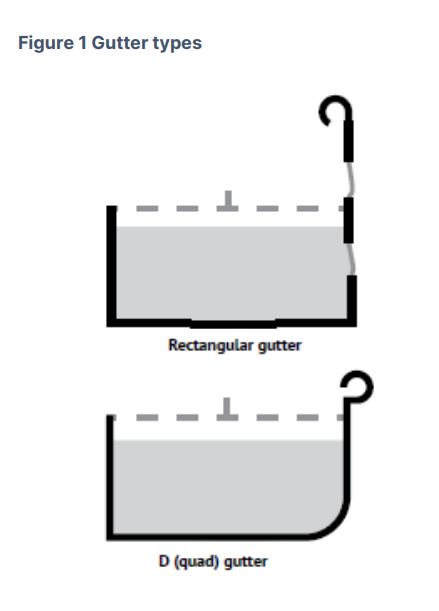
- Should not interfere with the normal operation of any door, window, access opening or occupancy of a building
- Should not cause a nuisance or lead to injury of a person
- Should be as close as practicable to the supporting structure
- Should be protected from mechanical damage
When installing a downpipe within the building, the downpipe must be tested in accordance with AS/NZS 3500.3 Section 9 and must not have combustible downpipes in the encroachment space.
Downpipes used for the collection of roof water supplying a rainwater tank that is used for drinking water must be AS/NZS 4020 compliant.
How To Make Downpipes Last Decades?
What are some things you can do to make sure your downpipes aren’t damaged?
- Install gutter guards so less debris enters your guttering system. This keeps your downpipes clear.
- Install your downpipes correctly, as properly-installed downpipes are less likely to corrode. You want to ensure downpipes are securely attached to your exterior and repel water at least 5 feet away from your foundation.
- Regular inspections help detect and deal with downpipe corrosion early before it gets worse.
- Don’t neglect corrosion (or any kind, not just downpipes), as it can result in a chain reaction of home maintenance issues.
- Keep an eye on structural or landscape damage. Structural damage, landscape damage (such as eroded areas, hardscape features, and plants) result in many repair costs. After all, you want to protect your spaces from the ground up!
Do you need qualified roof leak detection in Melbourne? Whether you’re worried about rust spots, soil erosion, water leakage, odd-looking gutter joints, or clogged gutters, Xclusive Roofing helps you with a full gutter replacement, which includes the downpipes.
Roof Leak Repair in Melbourne: Contact Xclusive Roofing
From minor issues to major damage, the Xclusive Roofing team offers downpipe roofing support to Frankston, Cranbourne, Dandenong, Berwick, and Beaconsfield residents in Melbourne.
Using a professional plumber to install or repair corroded downpipes ensures they are connected correctly to all relevant components, reducing the likelihood of problems occurring in the future. We can repair your roof effectively with roof restorations, COLORBOND® steel roofing, custom made flashings, gutter replacements, box gutters, and more. Contact us today at 03 5978 6473 or email quotes@xclusiveroofing.com.au for an obligation-free quote and for after-hours emergencies.



